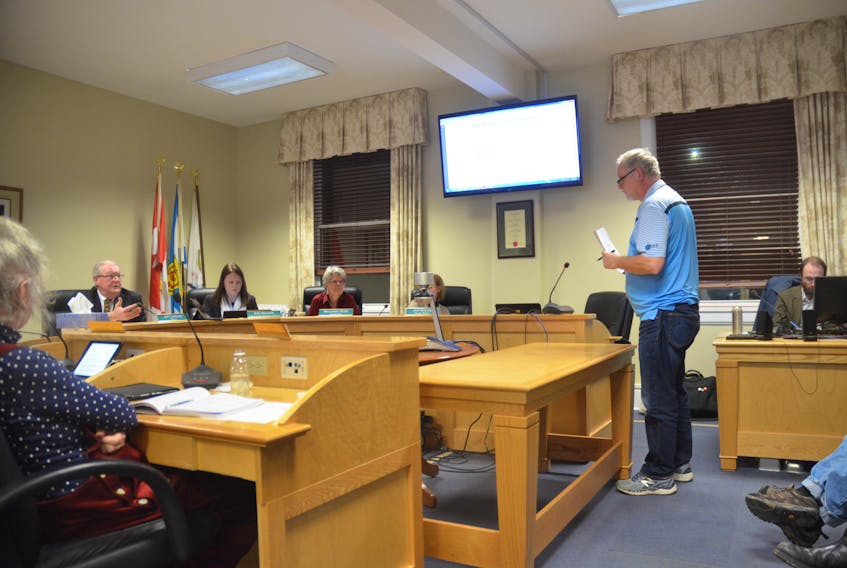WOLFVILLE, NS - Emotions ran high at a special Wolfville town council meeting where amendments that would permit off-site sales for microbreweries were considered.
The council chamber was packed as first reading was given to the Municipal Planning Strategy (MPS) and Land Use Bylaw (LUB) amendments at the Feb. 4 meeting. The amendments would enable off-site sales for accessory uses – including breweries – in the C1 (Commercial) Zone.
The matter will now progress to a public hearing before council considers second and final reading. A date for the hearing has yet to be set.
At the heart of the debate are concerns from area residents regarding the Church Brewing Company, located in the former St. Andrew’s United Church at 329 Main St., including the volume of beer to be produced and issues that this could potentially raise.
The establishment includes a restaurant and brew pub, retail space and a microbrewery as an accessory use. The business also has frontage on Seaview Street, which is primarily residential.
Wolfville council heard from 12 individuals between the public input session at the beginning of the special meeting and the public comment period at the end.
Church Brewing Company president and CEO Steve Haysom said their door is open. They encourage neighbours and others with questions and concerns to come and see them.
He said there has been “a significant amount of misinformation circulated” with respect to the business.
“Those individuals have decided not to ask us directly but instead opined on our business and encouraged misinformation to be widely distributed in order to disrupt and obstruct the business and spread dissent throughout the greater community,” Haysom said.
He estimates that the process to acquire a development permit and a subsequent judicial review has delayed their project by six months.
Heated exchanges
As Church Brewing Company brewmaster Andrew Bartle was about to speak, concerned resident Ian Palmeter spoke out that council was hearing from the proponents, not the public, and this wasn’t fair given the half-hour allotted.
Mayor Jeff Cantwell said the purpose of the meeting was to address first reading of proposed amendments that would allow for off-site sales only and the floor was open to whoever wanted to speak.
Concerned area residents Karen MacWilliam and Glenn Howe both interjected, stating that they would be heard. MacWilliam said she had earlier requested a private meeting with council on the matter.
“We gave you six weeks’ notice, we gave you an agenda, you cancelled it at the last minute, I will be heard,” MacWilliam said as the mayor banged his gavel.
“Thank you very much, this council will decide who gets heard and when,” Cantwell said. “Who do you think you are?”
“That’s on the record,” Howe said. “Keep going, keep hanging yourself.”
Although it was less than eight minutes into the meeting, council voted to take a five-minute break.
When the public input session resumed, Bartle said they are a microbrewery, not a factory. They couldn’t produce as much beer as permitted by legislation for microbreweries - 15,000 hectoliters a year - in the former church space. Their goal is 5,000 to 7,000.
“We have no intention of negatively affecting anybody’s quality of life,” he said.
Concerned resident says mistakes were made
MacWilliam said town council has lost her trust. She described the current process as a “cloaked mechanism” to rezone the subject site and to appease the developers. MacWilliam said she will be writing the Municipal Affairs Minister outlining all of the town’s mistakes.
She said the proponents “made a major mistake” by failing to confirm in writing with the Town of Wolfville in advance of construction that the accessory use would allow them to sell beer off-site. The Town of Wolfville made a mistake when it failed to analyze and conclude that authorizing a brewery of this size is inconsistent with the existing MPS.
“Staff made a mistake when they concluded that the development was as of right and it was a mistake for the town to issue a development permit without a detailed plan,” MacWilliam said.
She told council you don’t fix mistakes by compounding them. One way to begin fixing the situation would be following the applicable rules and “doing your jobs.”
Concerned resident Terry Drahos said residents have raised valid concerns surrounding parking, water, sewage, lighting and noise. She said you could put bylaws in place but they do little good if not enforced.
“There are no concrete answers on how any of those are going to be dealt with,” she said. “It’s just superficial answers.”
Judicial review leads to amendments
Last year, MacWilliam and Howe applied to the Supreme Court for a judicial review of the development permit issued by the town to the Church Brewing Company.
In September, Nova Scotia Supreme Court Justice Gregory Warner upheld the development officer’s decision to allow a restaurant, retail space and accessory brewery but limited off-site sales for any accessory use.
Planning and development director Devin Lake said that, given the decision, council began exploring its options to move forward in October, including enforcement of off-site sales.
“The recognition at the time was that the Annapolis Cider Company is already doing off-site sales as an accessory use,” Lake said.
In November, council directed staff to proceed with the option of plan amendments to provide clear parameters.
The amendments would include a clear policy statement in the MPS related to the craft beverage industry; an amendment to the definition of accessory use to allow off-site sales and an amendment to the LUB to restrict “contract brewing” - contracting out excess brewing capacity to other companies.
RELATED:









